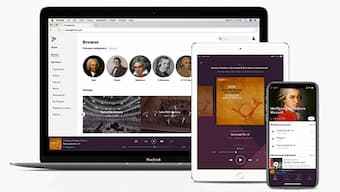
There’s been a marked increase in young people engaging with classical music through easily-accessible online broadcasts and livestream concerts
© Derek Bremner/Getty
Encouraging people to engage with and listen to classical music is an ongoing preoccupation for musicians, concert promoters, venue managers, critics and others. The perennial anxiety is that classical music is ‘dying’ (it’s not) and that it needs to attract a younger audience. Interestingly, during the year of the pandemic, there has been a marked increase in people, especially young people, engaging with classical music through easily-accessible online broadcasts and livestream concerts. Whether these new listeners translate into actual physical audience members when the concerts venues and opera houses reopen fully remains to be seen, but it is certainly encouraging.
What this also suggests is that this younger audience perhaps prefers to access classical music through the channels with which they are most familiar – online platforms such as YouTube, Vimeo and other video/livestream services. Consuming classical music through these platforms also relieves the listener of the real or imagined ‘etiquette’ and formality of classical concerts: many people are reluctant to sample classical music in its tradition setting of the concert hall for fear of not behaving correctly – not knowing what to wear, when to clap, etc. – and thus appearing ignorant to the more seasoned concert goers.

© Music Business Association – Music Biz
There is another aspect which can be off-putting to the newcomer to the art form and that is the opinions of others regarding one’s musical tastes. Unfortunately, fairly blatant snobbery still exists in classical music and some people are far too quick to criticise others’ tastes, deeming them uninformed, lacking in discernment, or simply “wrong”.
Encouraging people to engage with and listen to classical music means not shaming them for liking the popular or very well-known pieces – works such as Debussy’s Clair de Lune, or Beethoven’s Moonlight Sonata (the first movement only); Vivaldi’s Four Seasons or Tchaikovsky’s 1812 Overture; Vaughan Williams’ The Larking Ascending or Pachelbel’s Canon.
Claude Debussy: Suite bergamasque – III. Clair de lune (Nikolai Lugansky, piano)
These pieces are sometimes rather sneeringly referred to as ‘pop’ classics, but there’s a reason why they are so popular – and that’s because they are so damn good! These pieces were the ‘pop music’ of their time and the fact they remain popular today, is a mark of how well they have stood the test of time.
There’s nothing wrong in liking popular pieces: many of us are first introduced to and start to appreciate classical music by hearing these ‘pop’ classics in film or tv soundtracks or adverts, for example. (The Chinese superstar pianist Lang Lang admits his introduction to classical music came through hearing Liszt’s Hungarian Rhapsody No. 2 in a Tom and Jerry cartoon on television.)
Instead of criticising others’ taste in music, we need to be open minded about musical tastes and encourage people to engage with classical music in a positive way. If someone likes Clair de Lune, for example, perhaps suggest they listen to the entire Suite Bergamasque, which will introduce them to the variety of Debussy’s writing. ‘Pop’ classics should never be dismissed – they are a wonderful gateway to wider listening and appreciation of classical music.
For more of the best in classical music, sign up to our E-Newsletter
Johann Pachelbel: Canon and Gigue in D Major (Academy of Ancient Music; Christopher Hogwood, cond.)



